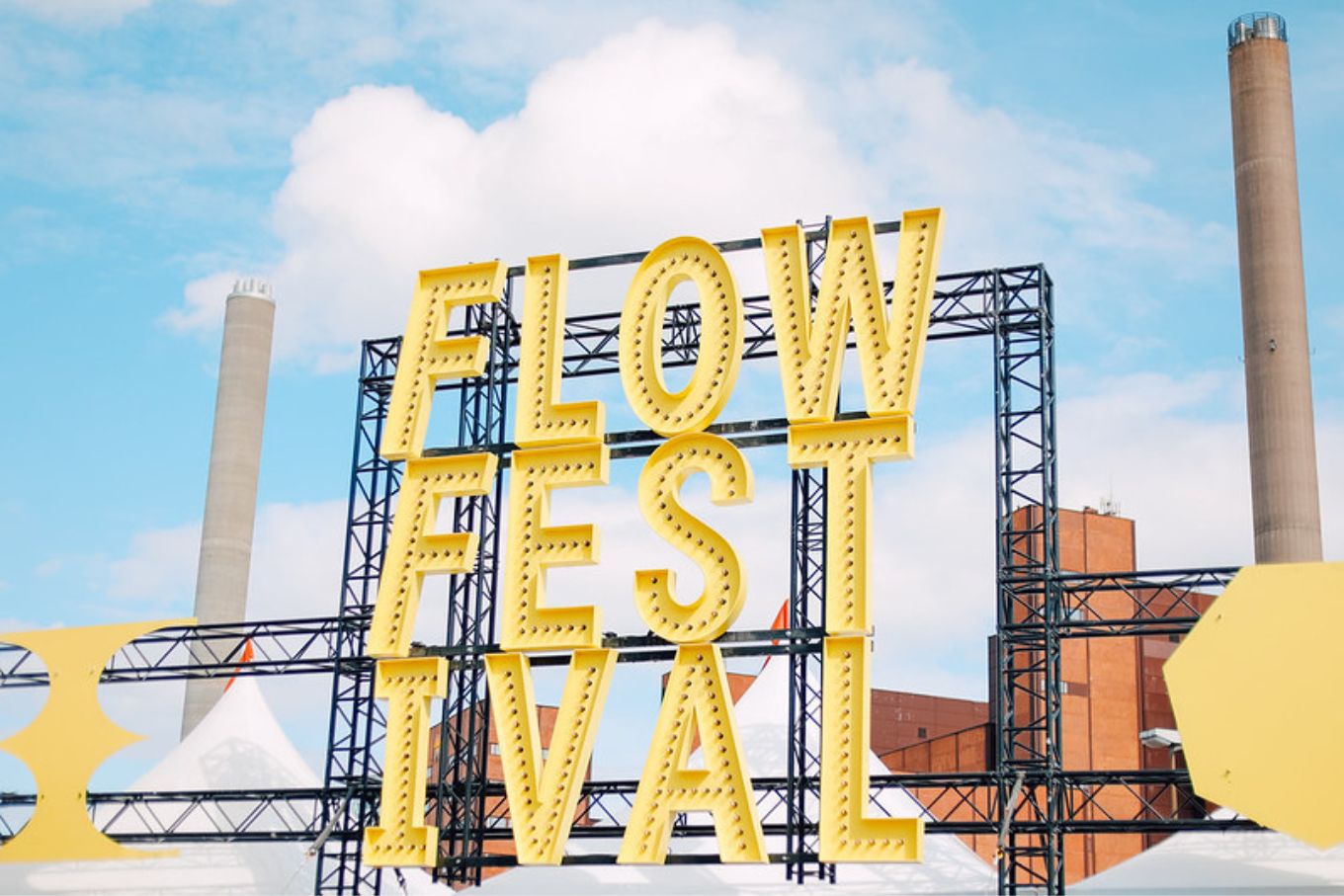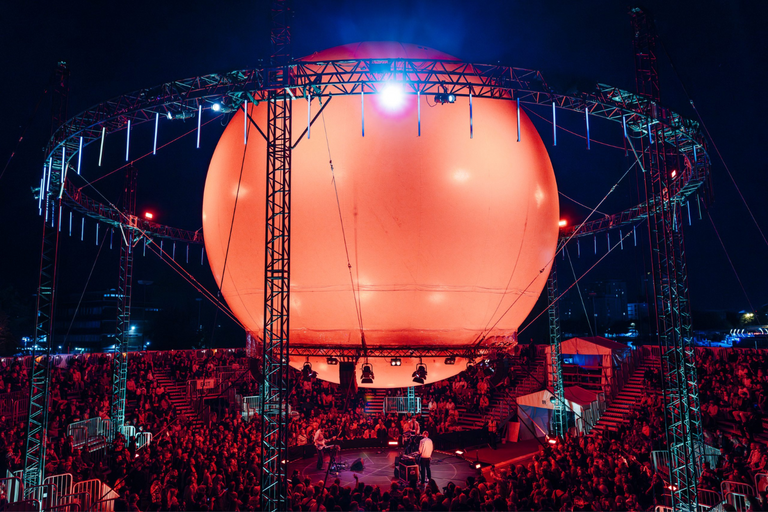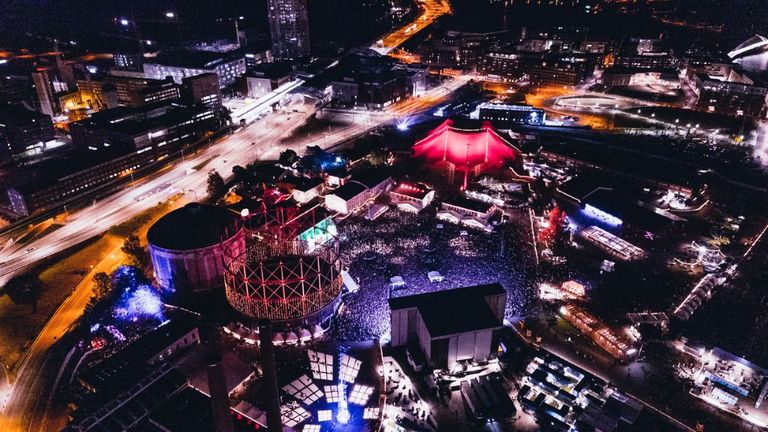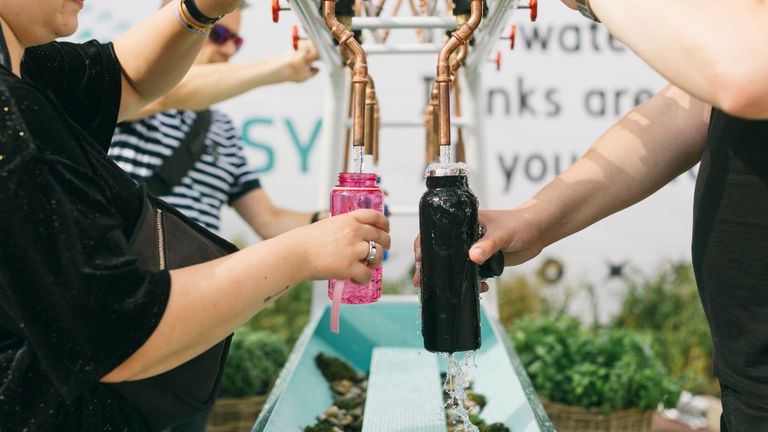Flow Festival 2025

Preparing for a music festival looks very different when three children under the age of seven are running around your feet. What once was about choosing outfits and making playlists now starts months in advance with the search for babysitters. Eventually, we were lucky enough to have a dream team—grandfather, grandmother, and aunt—all coming together to care for our kids. With that reassurance, my wife and I could finally look forward to a rare weekend just for ourselves at Flow Festival.
Getting ready for the festival began at my in-laws’ house. We had arranged for the children to spend the night there while we stayed at a friend’s place closer to the festival grounds. As we packed our backpacks, my father-in-law assumed my wife was just heading out for a photography gig. When we corrected him—no, we were both heading to Flow Festival for two full nights—his first reaction was disbelief: “But you’ll still come back to put the kids to bed, right?” After clarifying the plan, everyone relaxed, and the kids stayed happily behind, spoiled with treats and games at their grandparents’ home.
Another factor that makes the festival experience feel extra charged these days is that in Tanzania, where we live, there are hardly any similar festivals, nor much alternative live music. There is plenty of wonderful jazz, traditional music, and DJ-based music, but it felt refreshing to wander among tens of thousands of people just the two of us and enjoy both familiar and new music together.
FRIDAY
Walking in during the afternoon, Matti Mikkola’s band Saimaa was finishing its set on the main stage. Saimaa is a massive band that seems capable of almost anything in terms of skill and style. They closed their performance with a huge 70s prog version of the Finlandia hymn. While marveling at that, we slowly drifted toward the Silver Arena, where one of my personal favorites was about to begin.
ina ended their career about ten years ago as the band members moved on to solo projects and other ventures. Before disbanding, however, they released the legendary Soita mulle album, which they now decided to perform in its entirety. Performing full albums has in recent years become something of a trend globally. Regina delivered the songs in an unpredictable order, mixing in older material as well. The nostalgia was tangible, but the songs still sounded relevant rather than dated. The band itself seemed quite moved by the situation. Lepään aalloilla had never been a standout favorite for me on the record, but live it was indescribably beautiful.

After their one-hour set, we headed to the new Frontyard spot, set up between shipping containers behind a massive power plant. The new area worked brilliantly and was much more spacious. Never having been to Central European electronic music venues, I could still imagine the new Frontyard looking like something similar—an industrial atmosphere enhanced by Night Manouvers’ set. As darkness fell, the area became especially hypnotic with lights and smoke coming from all directions. Big props to Flow’s area designers for this change.
After exploring the new Frontyard, we finally had some time to wander the festival grounds without worrying about missing favorites. Flow has always been a visually stunning festival full of art and creative lighting. This year again, there were many interesting spots where people gathered to sit and take pictures—most likely for social media. Maybe it was just my impression, but with small adjustments to the layout, the festival seemed to have more space for sitting down and resting one’s legs. We took a quick look at Sudan Archives and Montell Fish, both fitting well into Flow’s lineup in their own unique ways, though neither quite struck a chord with me personally.

Another full-album performance came the same day when the legendary French duo Air played their Moon Safari in its entirety. Air has been somewhat significant to me over the years, and I awaited their set with both excitement and uncertainty. I had seen them years ago in Helsinki, and it was one of my biggest live disappointments—feeling as if I were simply listening to the album at home, only much louder. This time, the duo came on stage with a live drummer, and as La femme d’argent began, my nervousness remained.
The music sounded beautiful and suited the warm summer evening in Helsinki perfectly. Birds glided across the sky as the crowd eased into a chilled atmosphere. During the first couple of songs, they had significant technical problems, but once those were resolved, they truly came alive. It was wonderful to witness such confident playing, especially how the drummer’s work supported the basslines so impressively. The repeated “merci”s from the stage, paired with simple visuals, made everything feel timeless and elegant.
Walking from Air’s set toward the hip-hop legends Black Star, I reflected on how my age group is now at the stage where nostalgia is being heavily leaned on—and I don’t mind at all. What could be better than hearing bands and artists from one’s youth again among all the new acts? Seeing Yasiin Bey and Talib Kweli in Finland felt surreal. Both have long and remarkable careers in music and other arts, and I can only express deep respect. Flow’s energy was tight, and Silver Arena was packed with old-school rap heads, as shown by the countless hands bouncing in rhythm with the beats.

Unfortunately, at the same time, Autechre was playing in the Black Tent—a performance I had really wanted to catch. The duo was new to me, but reading about them beforehand made them sound fascinating. They performed without a single light, which is apparently their signature. Honestly, I wished they had been given a later slot, since the Finnish summer evening was still too bright for the tent to be properly dark. The soundscape was especially intriguing and at times even threatening. After listening for a while, however, we craved something a bit more approachable. Still, Autechre left a strong impression, and I’d happily hear them again in a proper club environment (to REALLY listen them, since there was nothing to see, heh).
Friday night’s headliner, FKA Twigs, was absolutely stunning—even though her music isn’t necessarily made for me. Barnett sang with incredible skill and purity, exuding charisma while also appearing vulnerable in front of thousands. Even without knowing her songs, I found myself immersed in her performance, especially her voice, which rang out crystal clear. And, of course, the visuals of an FKA Twigs show can’t be overlooked. I believe fans got far more than they could have wished for.

As the night turned to early morning, positive messages came from the grandparents’ house: the kids had gone to bed well, and everything had gone smoothly. After a quick rest and a meal, we headed to another of my personal highlights. Bicep had just begun their AV DJ set, and the tent was packed with people enjoying the kind of intense electronic music that forces every cell of your body to dance. There’s something about Bicep’s music that resonates with me perfectly, and it was incredible to share that experience with thousands of others dancing late into the night. The light show was at least as intense, perfectly synchronized with the music. It was without doubt one of the most breathtaking light shows I’ve ever witnessed. Bicep danced the crowd into exhaustion, and after the festival closed, the trip home felt endlessly long after all that beauty.
SATURDAY
The next day started slowly. A quick check-in with the grandparents reassured us that everything was fine, so we could enjoy the second day in peace. As we entered the grounds, we could already hear young fans singing loudly along with Olga. We only glanced briefly before heading to see Pehmoaino. Her dramatic music seemed to resonate strongly with the younger crowd, much like Olga’s but in a completely different style. Many sang along at full volume, clearly swept up in the moment. Pehmoaino’s music blends traditional Finnish influences with modern expression in a way that sometimes confuses me, as I struggle to find a clear point of connection. Still, I somehow enjoy her over-the-top dramatic style.
All that drama was soon washed away by the dance music of the Backyard, where Trevor Deep Jr. and friends got the crowd moving with soulful house. It was wonderful to watch the diverse festival crowd basking in the sun—some looking as casual as any ordinary day, while others were dressed more spectacularly than ever.
One Finnish band that has grown in popularity in recent years is Ruusut, led by Ringa Manner and Miikka Koivisto. They played a special set, performing lots of new material—some tracks without even names yet, according to them. Fans were surely excited. I personally enjoy their work, though at times some of the vocals didn’t quite suit my taste. Still, Ringa Manner is one of the most remarkable singers in the Finnish and even international scene—her voice no less stunning than FKA Twigs’. Special mention must also go to Ruusut’s bass sound, which was probably the heaviest of the entire festival.

One of Flow’s greatest strengths is its incredible musical diversity. From Ruusut’s experimental electronic productions, it was an easy jump to Veronica Maggio’s summery indie pop, and from there into the dark, hypnotic world of Oranssi Pazuzu. Their show was absolutely one of the festival’s highlights. Their last two albums are masterpieces of psychedelia, experimentation, atmosphere, and heaviness. The band’s playing was seamless, and at some point I realized this was one of the few bands performing without any electronic backing—everything was purely organic instrumentation. Oranssi Pazuzu deserves a strong mention, and I would gladly see them again anytime. During their set, everything felt exactly as it should.
Unfortunately, right after Oranssi Pazuzu, Little Simz began—also high on my priority list—so I had to cut the last 10–15 minutes short to secure a good spot. Little Simz opened with the first track from her latest album, Thief, instantly giving me chills. From the very first seconds, her charisma and boundless energy were undeniable. The set was built mostly from the new record and her acclaimed Sometimes I Might Be Introvert, with a few other selections. One of the most surprising and exciting highlights, however, was how much space she gave to songs from Drop 7—some of her most experimental and interesting work. I love those tracks, and hearing Mood Swings, Fever, Torch, and SOS all in a row was amazing. Little Simz’s charisma and versatility will carry her much further than where she already is. Her skills are simply unbelievable.
The final evening was a tough one for scheduling conflicts: the South African DJ duo Major League DJz overlapped with both Kneecap and the techno legends Underworld. Major League DJz worked brilliantly on the small X Garden stage, drawing a good crowd to enjoy their afrobeats, 3step, and amapiano. The twin brothers radiated confidence behind the decks, captivating the Flow audience. Kneecap brought their anarchistic, political show to Finland, and the tent was completely packed even though we arrived early before they started. Their set was aggressive and humorous at once, pulling everyone in. Throughout the day, there had been several statements of solidarity with Palestine, but Kneecap emphasized this more than anyone—unsurprisingly. Their performance was entertaining, but I still couldn’t resist catching at least a short part of Underworld’s set. The legendary duo’s techno sounded magnificent, and Born Slippy was, for me, the perfect ending to the festival. This time, our Flow experience was only two days long, as parental duties began calling us back home.
Flow 2025 was a successful and wonderful experience. As I wrote earlier, Flow brings together an astonishingly wide range of genres—from mainstream pop to African disco, from psychedelic metal to techno. It truly is a dream festival for any music lover, never locking itself into a single category.Looking back, Flow 2025 was more than just a festival—it was a reminder of why live music matters. For two short days, everyday responsibilities faded, and we stepped into a world built from sound, light, and shared emotion. The lineup, the atmosphere, and the people created something that felt both familiar and extraordinary. Walking back into family life afterward, a little sleep-deprived but deeply recharged, I carried with me not only the music but also the sense of freedom and connection it brought. Flow proved once again that even in the busiest seasons of life, there’s value in carving out space for music, for community, and for simply being present together in the moment.



